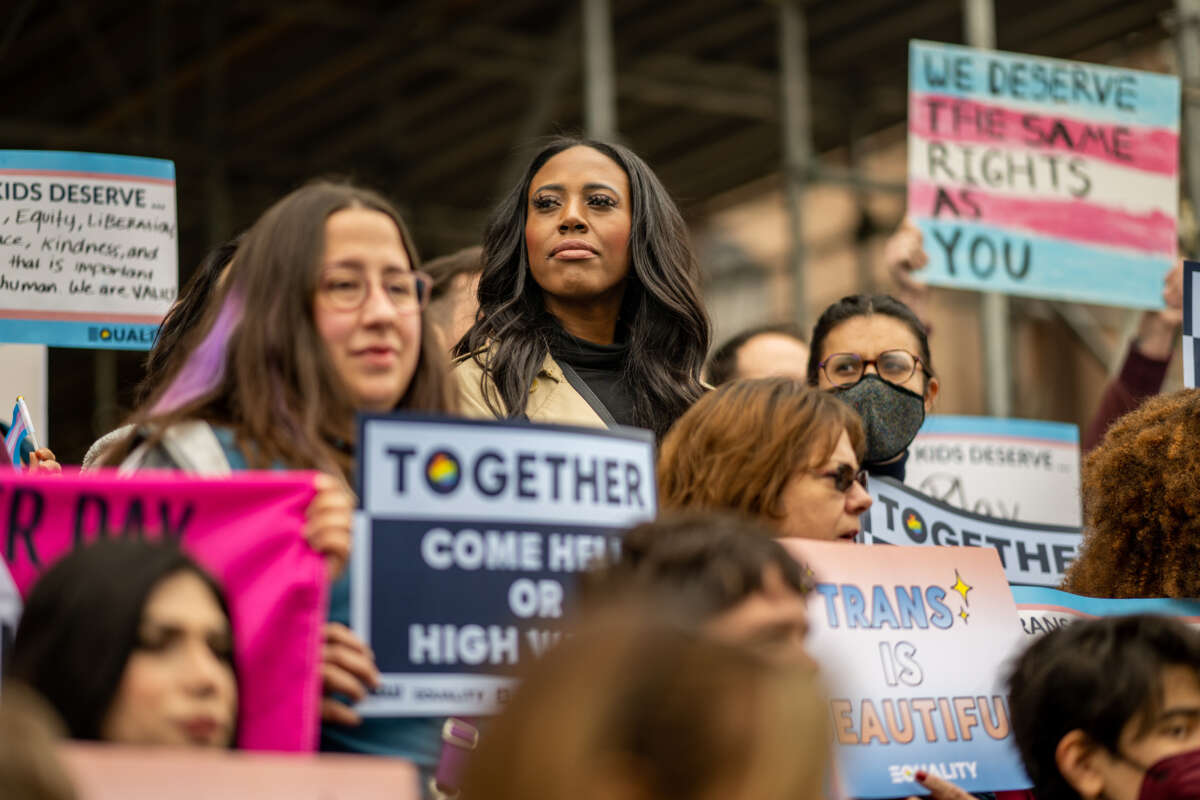Over half of high school-aged transgender youth are in danger of losing access to gender-affirming care, according to newly released data from the Human Rights Campaign (HRC).
As reported by the Williams Institute, there are more than 300,000 high school-aged trans kids, ages 13 to 17, in the U.S. Half of them (50.4 percent, or 151,300 total) live in states where trans youth have lost access or are at risk of losing access to gender-affirming care, due to discriminatory policies pushed by far right lawmakers.
The HRC reports that one in four trans children (22.9 percent, or 68,700 total) live in states that have passed bans on gender-affirming care and an additional 27.5 percent (82,600 total) of trans youth are living in states that are considering policies that will deny them access to needed health care.
So far in this legislative session, 430 anti-LGBTQ bills have been introduced across the country, according to the ACLU. Ten states have passed laws or policies that have banned access to gender-affirming care for transgender youth, and an additional 22 states are currently considering restricting trans kids from accessing lifesaving health care.
Transgender activist Erin Reed, who tracks and reports on anti-trans legislation, lists Alabama, Arkansas, Florida, Georgia, Iowa, Kentucky, Mississippi, Oklahoma, South Dakota, Tennessee, Texas, and Utah as having passed the worst anti-trans legislation this year.
Other states — including Idaho, Indiana, Louisiana, Missouri, Montana, Nebraska, North Dakota, Ohio, South Carolina, Virginia and West Virginia — are listed as being at high risk of moving into the ranks of the “worst states” in terms of anti-trans laws.
These laws are part of a coordinated attack on transgender existence. Recently leaked emails from anti-trans lobbyists reveal that the legislative attacks on trans people across the country are fueled by Christian nationalism; the 2,600 leaked emails show that there is an anti-trans “holy war” being waged against trans people, according to reporting from Vice.
“We have seen a sustained fear campaign against LGBT people in the United States over the last couple of years,” Reed explained. “[…]and these fears that they’re bringing up are then used by the same people that are bringing up the fears, by the way, in drafting the legislation.”
Within the past week alone, anti-trans bills have advanced in Florida, Indiana, Missouri and Montana, with Georgia becoming the 10th state to pass a gender-affirming health care ban for trans youth.
If passed, the Florida “trans ban,” as it has been called by transgender advocates, would not only ban trans youth from accessing lifesaving care but would also allow parents who oppose their children transitioning to take custody of their children from affirming parents who violate judges’ orders, ban birth certificate changes, and even ban adult private insurance coverage of gender-affirming care for transgender adults.
At the Florida’s House Healthcare Regulation Committee hearing on the bill, a person testifying against the legislation stated: “I encounter kids every day under the age of 18 who have been on healthcare for a lot of their lives […] By taking that away and forcing them to detransition, you will kill them.”
Indiana’s SB480, which recently passed 8-5 out of committee, would not only ban gender-affirming care for trans youth, but would also ban “aiding and abetting” such care. Therapists testified that the language of the bill would stop them from providing therapy to transgender youth.
Georgia recently passed a ban on gender-affirming health care for trans kids, making the state the first “Biden state” in the country to do so. If the governor signs the legislation into law, medical providers will be criminalized for proving gender-affirming care to transgender youth.
Advocates have pointed out that this bill explicitly names autism, alongside “other mental health and developmental conditions,” as a worrying justification for criminalizing gender-affirming care in the state.
Ableism is the packaging in which transphobia is delivered,” disability scholar J. Logan Smilges said on Twitter in response to the bill’s passage.
